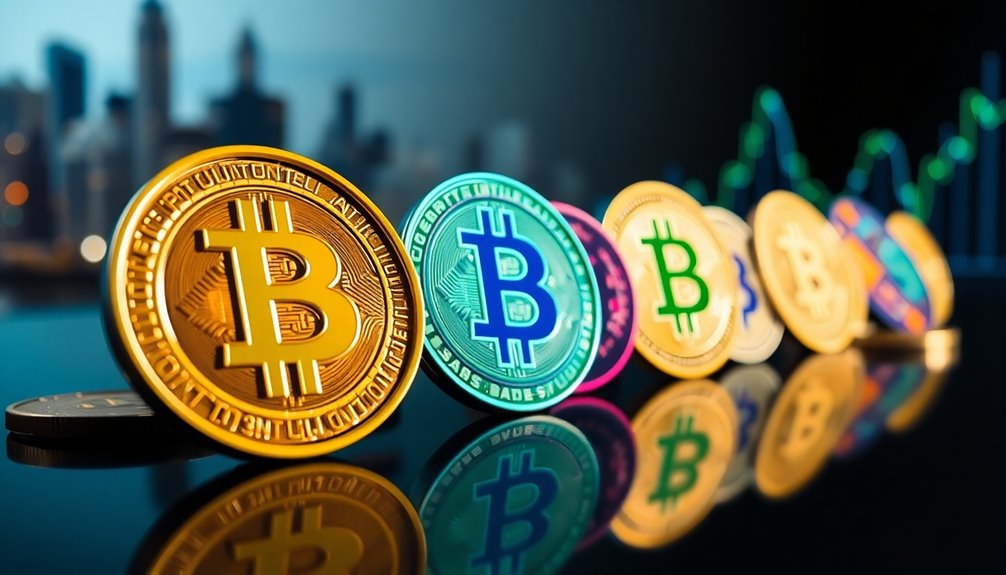Alternative cryptocurrencies, or altcoins, are revolutionizing the digital asset landscape. They offer diverse solutions tailored to various needs, like Ethereum's smart contracts and Monero's privacy features. As regulatory frameworks evolve, altcoins are expected to gain more attention, despite potential compliance hurdles. Market trends show growing trading volumes for these digital assets, which could lead to greater stability. While price volatility remains a concern, savvy investors recognize the potential for diversification. By understanding these dynamics, you can position yourself ahead in the ever-changing cryptocurrency world. You might uncover more insights as you continue exploring this exciting topic.
Key Takeaways
- Altcoins, like Ethereum and Litecoin, offer unique functionalities and use cases, expanding beyond Bitcoin's original framework.
- Privacy coins, such as Monero and Zcash, prioritize user anonymity through advanced cryptographic techniques, attracting privacy-focused investors.
- Regulatory developments, including potential securities classification, are shaping the operational landscape for altcoins, promoting a need for clearer compliance.
- Increased corporate investment in diverse altcoin portfolios mitigates risks and enhances overall liquidity in the cryptocurrency market.
- Market sentiment and news significantly influence altcoin price volatility, highlighting the importance of informed trading strategies for investors.
Emergence of Altcoins

The emergence of altcoins has transformed the cryptocurrency landscape, offering a diverse array of digital assets that cater to various needs and use cases. Some altcoins focus on enhancing transaction speeds, while others aim to provide greater privacy or serve specific industries like finance or gaming. This diversification has attracted not only tech enthusiasts but also investors eager to explore the bitcoin and billionaires connection, as many affluent individuals look for opportunities beyond Bitcoin itself. As these alternative cryptocurrencies gain traction, they continue to challenge the dominance of Bitcoin by offering innovative features and solutions.
You'll find altcoins operating on their own independent blockchains, like Ethereum and Litecoin, while others, such as Bitcoin Cash, branch off to solve scalability issues.
Many altcoins, including Ethereum, have pioneered smart contracts and decentralized applications, enhancing functionality. Ethereum's transition to proof-of-stake (PoS) has further improved sustainability within the ecosystem.
Privacy-focused coins like Monero and Zcash leverage advanced cryptography to boost anonymity.
Additionally, utility tokens like Binance Coin serve specific purposes within their ecosystems.
As you explore this growing market, you'll notice increased trading volumes and renewed interest from retail traders, signaling that altcoins are reshaping the future of digital finance beyond Bitcoin.
Regulatory Changes Impacting Altcoins

As discussions around regulatory changes gain momentum, altcoins face potential shifts that could reshape their operational landscape. If altcoins get classified as securities, you might see stricter regulations impacting their market activity and investor participation. Popular coins like Dogecoin and Shiba Inu could be affected, leading to increased transparency requirements and tax obligations. Concurrently, U.S. Congress is pushing for clarity through bills like the Responsible Financial Innovation Act and the Digital Commodities Consumer Protection Act. These initiatives aim to establish standardized regulations for digital assets, including stablecoins, while state-level actions also enforce compliance. Bipartisan congressional bills introduced since 2022 emphasize the need for clear regulatory frameworks in the evolving digital asset space.
Price Volatility Patterns

In the rapidly changing landscape shaped by regulatory shifts, understanding price volatility patterns in altcoins becomes increasingly important.
Market sentiment plays a crucial role; positive news can send prices soaring, while negative news often leads to swift declines. This emotional trading creates a herd mentality, with fear and greed driving drastic price movements.
Additionally, supply concentration among a few large holders can lead to unpredictable swings, as significant trades by crypto whales can manipulate market trends. Furthermore, market sensitivity to news, regulatory updates, and technological changes significantly influences price fluctuations.
Increased liquidity and trading volume can help stabilize prices, but sudden surges can trigger rapid changes.
Technological advancements and regulatory updates further impact volatility, making it essential for you to stay informed and ready to adapt.
Corporate Investment Strategies

While navigating the complexities of corporate investment strategies in alternative cryptocurrencies, it's crucial to understand how digital assets fit into your overall financial framework.
Start by thoroughly assessing the types of investments your company is considering, and ensure you're aware of the associated risks. Maintaining adequate liquidity is essential for quick asset liquidation if necessary. The volatility of crypto markets presents both risks and opportunities that should be factored into your investment decisions.
Embracing a diversified portfolio can reduce reliance on traditional assets and hedge against fiat currency fluctuations. Collaborate across departments for effective governance and risk management.
Regularly monitor your investments to ensure alignment with strategic goals, and be prepared to adapt as the digital landscape evolves. A disciplined approach to analysis and execution will support your corporate investment strategy in the ever-changing cryptocurrency market.
Government Policy Shifts

Government policy shifts are reshaping the landscape of alternative cryptocurrencies, creating both opportunities and challenges for businesses and investors.
The transition of regulatory authority from the SEC to the CFTC promises clearer definitions between securities and commodities, allowing for streamlined compliance. This change encourages innovation while resolving uncertainties in decentralized finance (DeFi) platforms. Furthermore, the U.S. government's regulatory approach emphasizes balancing innovation with consumer protection as it develops frameworks for digital assets. As a result, investment regulations are becoming more crucial for businesses looking to navigate this evolving landscape.
Meanwhile, the IRS's new mandate for detailed cost basis reporting adds complexity for taxpayers, pushing the demand for advanced tax software.
In the EU, the MiCA regulation establishes standardized licensing requirements, enhancing consumer confidence.
While these developments may introduce compliance hurdles, they also pave the way for a more stable and trustworthy crypto environment, fostering global harmonization in regulations.
Market Adoption Trends

The evolving regulatory landscape is setting the stage for remarkable growth in market adoption trends for alternative cryptocurrencies. You'll notice a surge in the popularity of currencies like Litecoin and Ether, with global ownership rising over 30% year-over-year, reaching 560 million by 2024. Europe leads the market, holding over 39.5% share. Emerging markets in South America and Oceania show the highest growth rates. Technological advancements, like blockchain and DeFi, enhance usability, while stablecoins attract users seeking stability. Additionally, the significant growth of the cryptocurrency market is fostering increased interest and investment from various sectors. Solana's potential growth has also become a major focus, as its rapid ecosystem expansion draws more investors. Institutional investments from hedge funds and banks signal confidence in digital assets. Retail investors are also engaging more, diversifying portfolios and taking advantage of cryptocurrencies as inflation hedges, driving overall market expansion.
Frequently Asked Questions
What Are the Most Popular Altcoins Currently Available?
When you're looking at popular altcoins, Ethereum (ETH) leads with a market cap of $389 billion.
Tether USDt (USDT) offers price stability, while BNB, Solana, and XRP showcase significant growth potential.
Community-driven projects like Dogecoin and Shiba Inu engage dedicated followers.
Technical advancements in Solana and Avalanche enhance transaction speeds, making them appealing.
You'll find various investment opportunities, from established coins to innovative newcomers like Mogcoin and yPredict.
How Can I Safely Store My Altcoins?
So, you think storing your altcoins is as easy as tossing them in a sock drawer? Think again!
For safe storage, consider hot wallets for quick access, but remember they're vulnerable to hacks. Cold storage, like hardware wallets, offers better security but requires a bit more effort.
Paper wallets keep things offline, while crypto custody solutions provide professional management—at a cost.
Choose wisely, or those altcoins might just vanish into the digital ether!
What Are the Risks of Investing in Altcoins?
Investing in altcoins comes with several risks you should consider.
You face a lack of regulation, which makes fraud and hacking prevalent. The market's high volatility means prices can swing dramatically based on sentiment or news.
Low liquidity can complicate selling your assets, potentially leading to losses.
Lastly, be cautious of scams promising unrealistic returns; thorough research is essential to avoid falling victim to deceptive tactics.
Always protect your investment with due diligence.
Can Altcoins Be Mined Like Bitcoin?
Yes, you can mine altcoins like Bitcoin, and yes, they often use similar proof-of-work methods.
You'll need specialized computers to solve complex hash puzzles, just like with Bitcoin mining.
However, altcoins can vary in mining difficulty, energy consumption, and block rewards.
Some even adopt different consensus mechanisms, giving you a range of options.
How Do Altcoins Differ From Stablecoins?
Altcoins and stablecoins serve different purposes in the cryptocurrency world.
Altcoins often aim to enhance features or solve issues found in Bitcoin, leading to high price volatility and potential gains or losses.
In contrast, stablecoins are pegged to stable assets, providing price stability and reliability for transactions.
While altcoins can be speculative investments, stablecoins focus on usability and reducing volatility, making them suitable for everyday transactions and bridging traditional finance with crypto.
Conclusion
As you explore the world of alternative cryptocurrencies, remember that while Bitcoin may be the king, altcoins are the vibrant court that brings diversity and innovation to the digital asset landscape. With regulatory shifts and growing corporate interest, these alternatives are carving out their own niches. Keep an eye on market trends, and don't underestimate the potential of these digital gems; they just might shine brighter than you expect in the future of finance.









